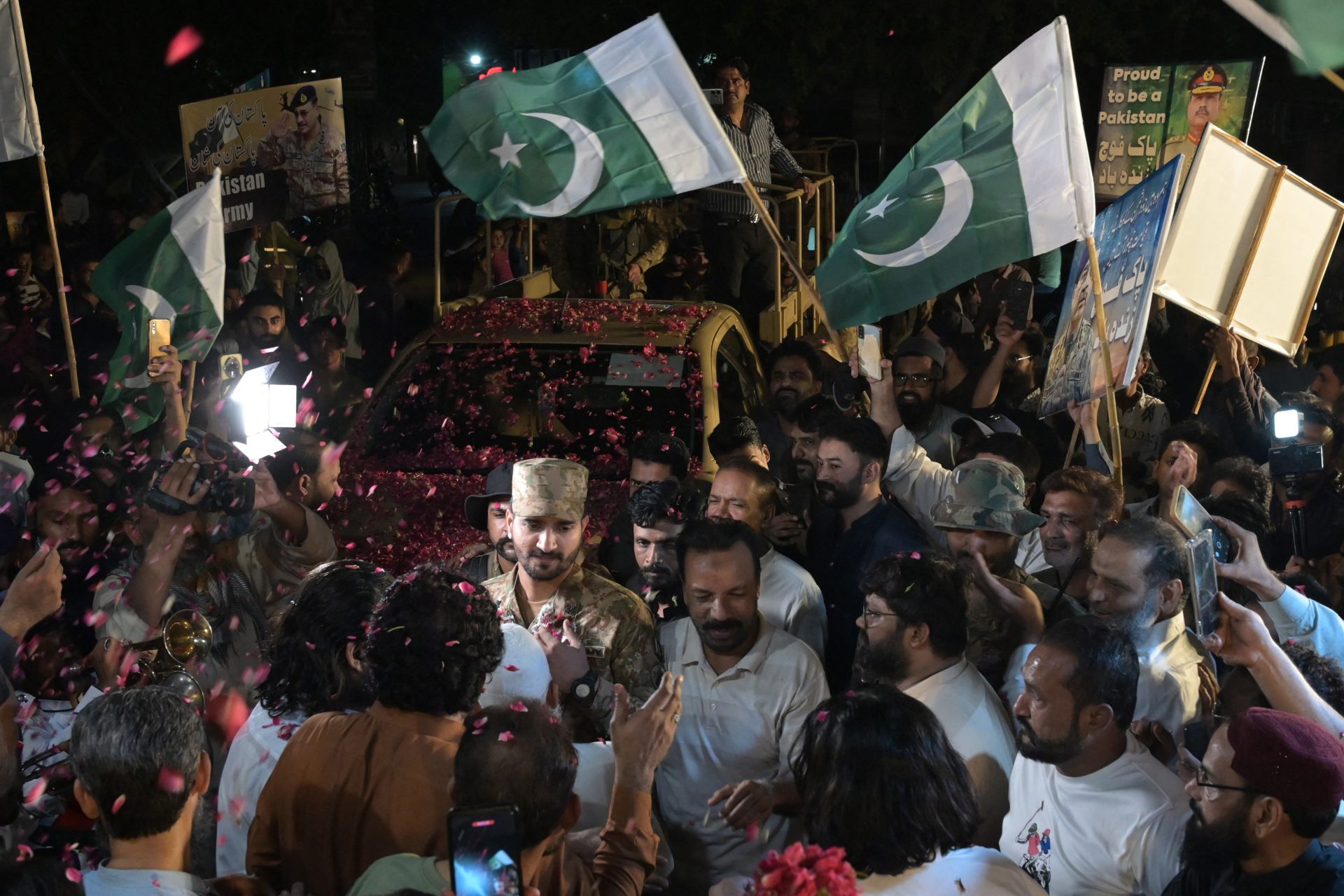As tensions between India and Pakistan eased over the weekend with the announcement of a ceasefire, a small Catholic community in Punjab, Pakistan, gathered in prayer for peace—unaware their vigil would coincide with a critical breakthrough.
“We know that the Lord hears the prayers of the children who are in his heart,” said Fr. Qaisar Feroz, OFM Cap, parish priest at Our Lady Queen of Angels in Bhai Pheru, on the outskirts of Lahore. “And the ceasefire between India and Pakistan has a very special meaning for us because we consider it a truce.”
Speaking to Fides News Agency, Fr. Feroz recounted how parishioners—children, families, and religious sisters—gathered on Saturday, May 10, to pray the Rosary before the shrine of Our Lady Queen of Peace.
“Children and young people were present, while the girls from the ‘Ibne Mariam’ boarding school recited songs of peace and devotional prayers,” he said.
At the end of the service, the community released doves and held placards that read “Yes to Peace, No to War.” Soon after, news of the ceasefire reached the parish.
“We received the wonderful news of the announcement of a ceasefire between India and Pakistan,” said Fr. Feroz. “Now we hope that it will hold and that we can create a just and lasting peace between the peoples.”
The sense of relief was heightened by the community’s proximity to recent violence. A bullet had reportedly struck an industrial site within parish territory days before the ceasefire, underscoring the conflict’s reach.
“It was a bit like we felt the war coming home,” Fr. Feroz said. “There was great concern, and that is why we intensified our prayers for peace.”
Church welcomes ceasefire, urges continued dialogue
The Catholic Church in Pakistan has welcomed the truce as a vital step toward stability. Bishop Samson Shukardin, OFM, President of the Catholic Bishops’ Conference of Pakistan, called the ceasefire “a source of great relief and hope for millions of people throughout the region following the recent tensions and military clashes.”
In an official statement, the bishops expressed appreciation to Pakistani Prime Minister Shehbaz Sharif and Indian Prime Minister Narendra Modi “for choosing the path of dialogue and moderation,” and acknowledged the role of international mediators, including the United States, in facilitating the ceasefire.
“The peoples of South Asia have long yearned for peace, stability, and cooperation,” the bishops said. “We pray that this ceasefire marks not only the end of hostilities, but also the beginning of a new chapter of mutual understanding, reconciliation, and regional harmony.”
Archbishop Joseph Arshad of Islamabad-Rawalpindi, who also chairs the National Commission for Justice and Peace, echoed the sentiment.
“This ceasefire is also a reminder that diplomacy has the power to overcome conflict,” he said. “It is vital that both nations continue dialogue to address long-standing issues and find lasting solutions that prioritize the well-being and security of their peoples.”
Church leaders on both sides of the border have called for efforts to “build stronger, more reliable, and peaceful relations to ensure a better future for all,” and for the “spirit of justice, peace, solidarity, and fraternity” to guide inter-state relations in the region.
WCC warns against cycle of retaliation
The World Council of Churches (WCC) also joined the call for restraint and dialogue, warning that further retaliation would only prolong suffering in the region.
“We express deep concern for the welfare of the people of both India and Pakistan and of the wider region in the intensifying confrontation between the two nuclear-armed nations,” said Rev. Jerry Pillay, general secretary of the WCC.
“India and Pakistan share not only a border but also deep histories, cultures, and hopes for a better future,” he said. “Escalation of violence and conflict will only bring more grief to innocent lives on both sides.”
Pillay said the loss of civilian lives must not justify more violence. “With the current retaliation by India and the response by Pakistan, many more civilians are being killed and injured,” he said. “The pain of loss and the urgency of justice must not lead to further violence or suffering.”
He stressed that “dialogue, diplomacy, and mutual respect” are the only sustainable paths to peace. “Let us honor those lost not with retaliation but with resolve—the resolve to break the cycle of violence and choose peace,” he said.
Fighting subsides but concerns remain
The ceasefire came after days of deadly exchanges between Indian and Pakistani forces following a militant attack in Indian-administered Kashmir that killed 26 civilians—mostly Hindu tourists—on April 22.
According to a report by Agence France-Presse, Indian troops killed three suspected militants on May 13 during a clash in the Keller forest of southern Kashmir, marking the first such encounter since the ceasefire.
India accused Pakistan of harboring the perpetrators of the April massacre—a charge Islamabad denies. In response, India launched missile strikes on what it claimed were militant bases across the border, sparking four days of cross-border attacks.
Pakistan reported that 40 civilians and 11 soldiers had died in the Indian strikes, while India reported 15 civilian and five military casualties. Both nations have accused each other of violating the ceasefire before ultimately agreeing to halt hostilities.
Despite the uneasy calm, religious communities continue to call for peace. As Fr. Feroz reflected: “Now we hope that [the ceasefire] will hold and that we can create a just and lasting peace between the peoples.”







